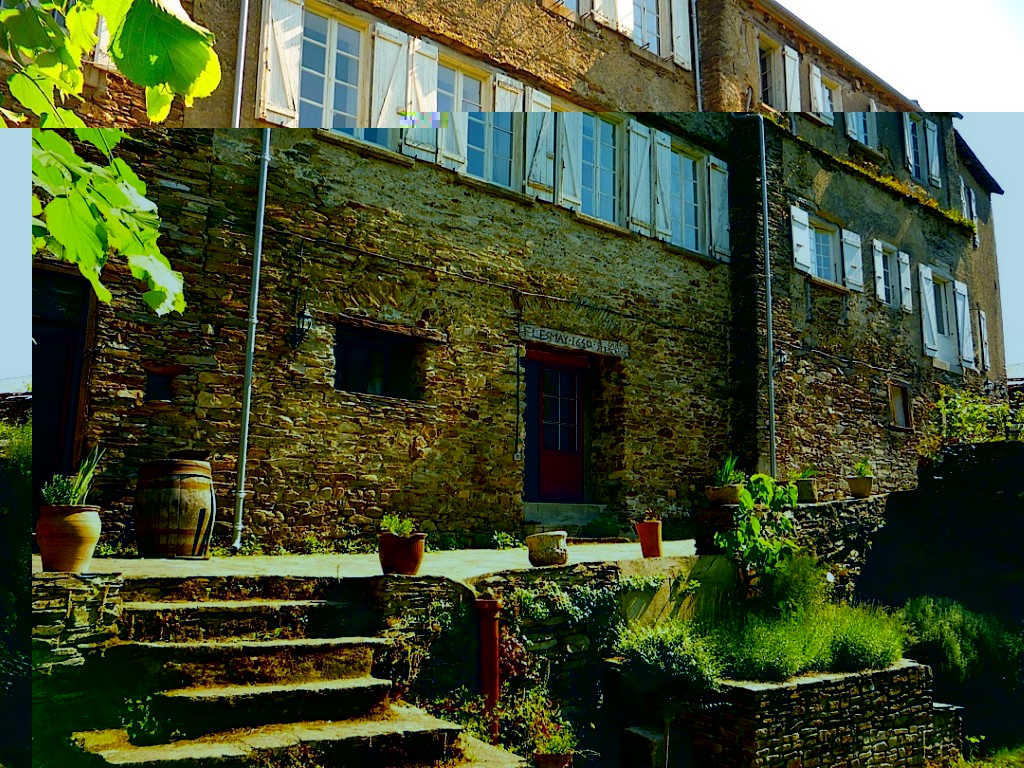
Since I had been contemplating quite a few posts on the joys, trials, and logistics of formal writing retreats for, well, the entirety of my most recent writing retreat, I have been busily jotting down questions I wanted to address for a couple of months now. After I returned, it occurred to me: instead of attacking the resulting raft of issues entirely from the retreater’s perspective — which, let’s face it, has been my approach every time I have blogged about retreats in the past — why not hand this excellent list to some kind people who actually RUN an artists’ retreat, so my readers could have the benefit of a less-often-heard perspective?
So although I am not much in the habit of packing up my troubles in my old kit bag and handing it to other people, I instantly got busy blandishing my favorite retreat organizers, Kerry Eielson and John Fanning of La Muse in Labastide Esparbaïrenque, in the remote Montagne Noir of southwestern France.
If that sounds pretty far off the beaten path, that’s because it is. La Muse is concealed in a miniscule village nestled onto a mountainside far, far away from both the madding crowd and anyplace that it would even occur for a tourist to visit, despite the fact that you can’t drive for fifteen minutes in any direction without stumbling upon some ruined castle so picturesque that I kept walking up to touch the stonework to reassure myself that it wasn’t just a painted backdrop for a romantic film about the Knights Templar.
It is, in other words, the material embodiment of the concept of getting away from it all. When my phone is ringing off the hook while I’m trying to polish off that last chapter of a novel, I automatically start looking for a place like La Muse.
So Kerry and John don’t just operate a retreat; they operate a retreat.
Who better, then, to ask to enlighten us on the ins and outs of serious writers’ retreats, or to answer my questions pertinent and impertinent? Or, to continue yesterday’s discussion, to enlighten us on what differentiates a successful fellowship application from an unsuccessful one.
In case I’m being too subtle here: if you are now or ever intend to apply for a residency, you’re going to want to take some notes on this extended interview.
Welcome, John and Kerry, to Author! Author!, and thanks so much for agreeing to share your insights with us!
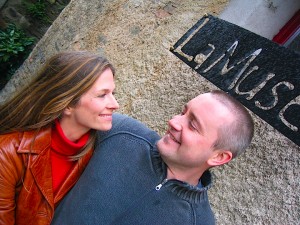
Anne: Let’s start with the basics. What made you want to open La Muse in the first place?
Kerry: The first reason we started La Muse was because WE needed a retreat to go to, as did other writers like us: young people with full-time jobs that didn’t allow much time for writing.
Anne: Oh, I know so many aspiring and established writers who fall into that category.
Kerry: We were not all that connected, not all that pedigreed, not established in the world of creative writing. We were “writers” working in stimulating and exciting jobs but without time or space for our own creative writing projects and ambitions. There was nothing out there in terms of retreats that was simple and affordable, that focused on the process of writing without lots of talks and readings and workshops, without the groupie-vibe of some conferences.
We just needed a place to go to be able to write: La Muse!
Anne: It’s astonishing how seldom time to write seems to be built into workshops. I often come away all excited about my writing, but too exhausted to do any of it for the foreseeable future.
But enough about me: why not pursue the standard great big institutional artist colony route?
Kerry: We also felt the Catch-22 of not being established writers, and so not being able to benefit from grant-funded institutions or retreats that are more accessible to established writers or writers in the MFA system or cottage industry. We weren’t on “the track” and, believe it or not, it is mighty difficult for two full-time staffers at relatively high-powered magazine jobs in NYC to get on it.
We were lucky to have great jobs, which we appreciated and took seriously, were working more than that great American standard of 60 hours a week. I got up at 4:30 AM to have two hours of my own writing, and time to jog every day. John did the opposite, staying up until about that time to get his writing done. We didn’t sleep, didn’t see each other and though we were happy, motivated and exhilarated, we knew we couldn’t keep it up forever.
We wanted to write. We wanted to have a family life with the kids we hoped to have some day, AND we wanted to own our home–not an option with our low publishing salaries in New York City.
Anne: I see; you wanted to write AND have a life.
Kerry: And so, two newly-weds, we were talking about how we could make it all work. We decided to leave NYC and in dreaming about where we might go from there, we went online and found La Muse, then a huge run-down old manor house for next-to-nothing. We started dreaming out loud, planning this hypothetical life and next thing we knew; it was ours!
Anne: Wait — you bought a retreat online?
John: Kerry pretty much summed it up there, except for the fact that we did it all on credit cards. We also stripped layers of wallpaper from the ceilings, threw out about ten truckloads of junk — I mean truck truckloads, not van loads. You wouldn’t believe the amount of stuff that was in here.
Anne: For the benefit of those who have not yet been there, I should point out that I’ve lived in towns with smaller courthouses than La Muse’s main building. Some of the rooms are immense. And didn’t you lay the stones of the patio yourselves?
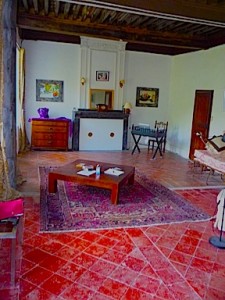
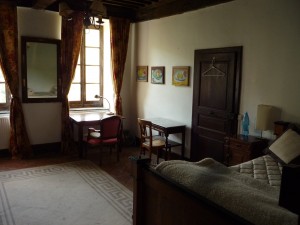
John: Let’s just say the renovation process was an experience.
Anne: Given how beautiful both the building and the locale are, I’m sure that it wasn’t easy at first to establish La Muse as an artists’ retreat, rather than just a gorgeous vacation spot. Just to nip in the bud any possible misconceptions, how is a residency at La Muse different from a vacation?
Kerry: The focus of a stay at a writers’ retreat is on writing, not tourism.
John: Exactly. A writer’s retreat is just that, a retreat. You retreat from all the bustle of telephone calls, email, appointments, work etc. to connect with whatever it is you need to connect with to get your project finished, started, researched.
Anne: That last is why La Muse has wireless internet access, presumably. As much as I love a get-away-from-everything retreat, I actually couldn’t have done the necessary research on my novel without the occasional web crawl.
Since you’re both writers yourselves, I understand the impetus to create a writers’ retreat. So why does La Muse welcome many kinds of artist, instead of just writers?
Kerry: We saw no reason to limit our attendee to one kind of artist, and it happened organically. Visual artists asked if they could come. I love painting and drawing, and this place, with its rich light, is a heaven to visual artists. In fact, I’m more often inspired to draw here than write.
Anne: Having run a mixed retreat for a while now, what do you think different kinds of artists get from retreating together? Or, perhaps more to the point for my readership, what do writers gain from sharing retreat time and space with other types of artist?
Kerry: There is a nice exchange between the visual artists, composers and writers; a lot of artists are multidisciplinary-talented and they come away from conversations with artists in other mediums feeling inspired.
John: Artists generally regard the world around them more than writers. They have to concentrate on the colors, the shapes, on the lines all around them, not the ones inside their heads, so both groups really add to each other’s process.
Anne: Is that why you have been expanding the studio space?
Kerry: The same kind of informal, small-scale retreat seemed to be missing for visual artists. So, we made a studio, and then another studio.
Anne: I suspect that most people have a pretty easy time picturing the kind of studio space that might appeal to a painter or a sculptor, but I’ve noticed that there isn’t really a strong cultural conception of what kind of space might be conducive to writing, other than a desk and a chair in someplace quiet. How do the facilities for writers differ from those for other kinds of artist at La Muse?
Kerry: Writers work in their own rooms. Artists working on drawing projects do, too. But artists working in oil paints or mediums that smell, make noise, stain or need lots of space use the studios.
John: Writers also use the library and artists will go out into the woods to paint or photograph a lot.
Anne: I know from personal experience that the weather also plays a role in where the residents choose to work. The weather was gorgeous for the last few weeks I was there, and there were hours at a time when I seemed to be the only one writing inside.
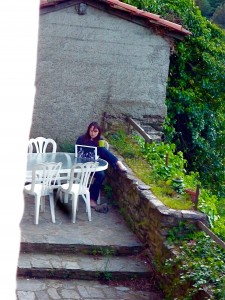
Anne: But as tempting as it is to dwell on the physical environment, let’s talk about the less concrete part of the retreat — or at any rate, less of what is literally set in stone. What do you think writers retreating at La Muse find there that they couldn’t possibly discover anyplace else?
Kerry: It’s a serious yet familial setting. Attendees can’t help but to get to know each other and us, and that creates a great opportunity for exchange.
John: Yes. We’re not a huge institution like Yaddo or the Doris Duke Foundation. We are small and we like it that way. It’s what people always tell us they love about La Muse.
Kerry: We are accessible, affordable, multi-disciplinary and non-institutional but also professional about what we do.
Anne: Since most of my readership lives in North America, I suspect that some of them might be surprised to hear a retreat on a remote mountain in France described as accessible. What does that mean, precisely?
Kerry: The intimate, familial setting is unique. Normally, La Muse has between four to eight attendees of a wide range of ages, backgrounds, nationalities and artistic mediums, at different stages in their careers, and they have a lot to offer each other. The shared kitchen and meals allow for unique exchanges. People forge friendships and collaborations here. People help each other on their work, and support each other in other areas.
Former attendees have said that the fact La Muse is structured (due to the quiet hours) but not rigid (there’s no other structure in place) actually creates time, more time than at other retreats.
Anne: We should probably explain to everyone about the quiet hours. Technically, attendees are supposed to limit noise-making within the house — talking, playing music, Skyping — to a very limited number of hours per day, so that 9 am to noon, 1 to 5:30 pm, and 10 pm to 7 am are quiet times, designed for devotion to work or sleep.
I’ve never attended a retreat that didn’t maintain at least the pretense of quiet times or spaces, though; I don’t think they could attract writers otherwise. Because the claims are so similar — I mean, doesn’t every retreat’s website claim it’s the least distracting place on earth? — it’s really, really hard for writers honestly looking for uninterrupted writing time to tell them apart.
The difference to work time, it seems to me, usually lies less in whether such rules exist than in how they are enforced — and in how many other distractions there are. In a village like Labastide, where you might bump into perhaps three residents on a heavy traffic day, there’s not a whole lot of ambient noise or activity to interrupt one’s work. And I just loved that you didn’t clutter up residents’ weeks with a whole lot of structured events, as so many of the larger retreats do.
John: We leave people to do what it is they have come here to do as opposed to having workshops and classes, etc.
Anne: Personally, I found that very respectful of my decision to retreat in the first place. But you do occasionally host groups that come together for a workshop, right? (Note to readers: this was not an entirely fair question; I’ve been toying with the idea of teaching an intensive novel seminar there.)
John: Although we have hosted Study Abroad programs, such as Iowa University’s, we leave the teaching to the organization that comes to organize. We help set up guidelines and orientation, but most of the time we leave people to their own process.
Anne: Which can make for some pretty intriguing interactions, since every artists’ process is different. Is that why you accept writers at all stages of their careers, rather than just the established — as many of the ritzier artists’ colonies do — or only those starting out?
Kerry: We accept attendees based on the seriousness of their intent and the quality of their application. Period.
John: Yes, and it really works out well for both parties. One rubs off the other, just the way those of different disciplines help each other.
Anne: Not to mention making it more fun for everyone concerned. Although I spent the vast majority of my waking time at La Muse writing, I’ve noticed that when I talk about it now that I’m back home, I often dwell on the social aspects, the trips out into the countryside, the cherries that were in season while I was there, and the like. It’s definitely unusual for a writer’s retreat to offer as many cultural exchange opportunities for retreatants who want to take advantage of them.
Kerry: We arrange French lessons, art-hikes with a local watercolor artist. We introduce our attendees to local artists whose work may inform theirs. We bring attendees on a wine-tasting, and a visit to nearby towns. So maybe on a logistical level, too, the “extras” make us unique.
Anne: You took one of my groups (note: I was there for two retreat sessions) to a fabulous traditional book town called Montolieu, where practically every building housed a book shop, library, or museum devoted to some aspect of printing. I’ll have to do a post on that, so more traveling writers know about it; I never would have made it there as a tourist on my own.
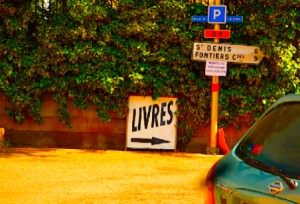
Kerry: There’s also an emphasis on well-being for those who are interested; we supply yoga mats, blocks, straps, and books, and arrange sessions for our attendees with a variety of therapists in the area.
Anne: Including massage and chiropractic for writers prone to repetitive strain injuries. Because I’m on my keyboard so much of the time on retreat — it’s not at all unusual for me to write 50 hours per week at an artists’ colony, although I think I averaged closer to 60 at La Muse — I always budget for some sort of bodywork.
It’s also kind of a fun way to meet the locals. Most of the villagers I met were very into the La Muse concept; a lot of them seemed to be artists themselves.
John: La Muse has a work ethos and a relaxed, community based structure that people have found very beneficial.
Anne: Since I’m guessing that most of my readers probably won’t have spent much time in 12th-century villages, let’s talk a bit more about Labastide Esparbaïrenque. What about it is conducive to retreating?
John: Labastide lends itself perfectly to a retreat because of its location off the main road – most villages have a main road going through them – as well as the fact that it hasn’t been tarnished by over modernization. The fact that it’s in a beautiful part of Southern France has got a lot to do with it, too.
Kerry: It’s a quiet village in a special place. The village is snuggled into a very curvy little valley, and there are no bars or cafés or boutiques to tempt people away from their work tables. With only 72 full-time habitants, there’s no noise except the elated screeching of diving swallows and a helpful rooster or two during the day and, at night, the muffled flow of the river and the rustling of leaves in the trees.
Anne: That’s such an evocative image that I’m going to leave it hanging in my readers’ minds and sign off for the day. Thanks, Kerry and John!
Next time, we’re going to get into the nitty-gritty of what is actually involved in running a writers’ retreat like La Muse — and just what kind of application package it takes to land a spot in a retreat like this. Happy daydreaming, everyone, and keep up the good work!